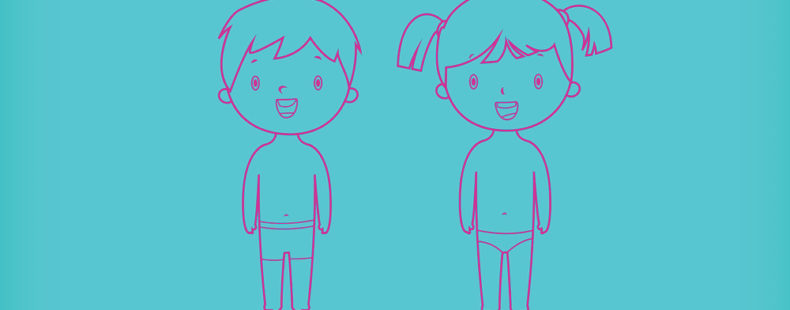by Rachel Bradley
Ah, childhood, those halcyon days when you chewed on a stuffed Mr. Snuffleupagus and cruised the driveway in your foot-pedaled convertible.
Childhood was also the time when, hopefully, you learned how to peepee—with your wee wee, weenie, peenie, winkey, giney, or jay-jay.
Ring any bells?
Those goofy names remind us that childhood is also when our private parts are often given cutesy names, when not more vaguely referenced as down there, that area, or you know ….
But, why do we rename penis and vagina, themselves perfectly normal words for perfectly normal body parts? What does that reveal about our cultural attitudes toward sexuality and the body? What does that teach our children?
Winkies, jay-jays, and other body part euphemisms
Children’s terms like winky and jay-jay, as well as more general polite expressions like man parts and lady bits, are called euphemisms. So are ding–dong, vee–vee, and all the many other words we have to replace penis and vagina.
Euphemisms are mild words that enable people to broach spicy subjects. From Greek roots that literally mean “good speaking,”
euphemisms help people speak about uneasy topics more sensitively—and not just wee–wahs. Passing on, for instance, is a euphemism for that ever tough matter of dying.
As author Ralph Keyes put it in his 2010 book Euphemania: Our Love Affair with Euphemisms, these words “represent a flight to comfort … they are comfort words.”
Sometimes, comfort is exactly what a tricky situation calls for. The tried-and-true cliché, “So sorry for your loss,” can be way better than the rawer alternative: “Gah, it’s awful your great aunt got smooshed under that tree.”
But, heat-reducing euphemisms are also receptacles for all the taboos, embarrassments, shames, fears, and discomforts of a society. One of the best ways to understand what gives a culture the heebie-jeebies is to look at what they use euphemisms for.
W
hat are some of the big things cultures veer around? Death. Sacred names. Ugliness. Intoxication. Weight. Old age. Bodily fluids and functions. And, oh—sex and body parts.
Why are sex and bodies taboo subjects?
Sex is natural; it’s how humanity regenerates itself. And, of course, we do it with our bodies. But, the act is, or should be, pleasurable and private. Plus, icky excretions emerge from those same organs. This means sex and bodies carry complicated social, cultural, and religious baggage—and come with thousands of verbal evasion tactics.
You might think euphemisms for private parts date back to that Golden Age of Prudery, the Victorian era. That was when legs were so sexy, apparently, people made reference to those racy body parts with the euphemism of … limbs. But, for thousands of years, we have been resorting to variations on the staff of life and chalice of purity to dance around the subjects of bodies and sexuality. In fact, the word penis itself likely emerged as a euphemism.
In Latin, words like mentula and verpa, both meaning “penis,” were considered obscene. Writing in the 1st century BC, Cicero noted that the ancients used the word tail for the male member—and that word in Latin is penis. Cicero also noted that, by his day, penis itself was already too spicy. (
This phenomenon, where the euphemism itself becomes taboo, has been dubbed the euphemism treadmill.)
If you want to dig into the innumerable ways English speakers have spoken—or have not spoken—about vaginas and penises, head to slang lexicographer Jonathon Green’s digital timelines. We did. You thought winky and jay–jay were weird?
In the late 1500s, parents may have
taught sons about giblets or kicky-wickies and daughters about their Venus’s highway.
In the ensuing centuries, parents may have used: flip-flap and tuzzy-muzzy (1600s); doodle and kitty (1700s); gingling Johnnie and that there (1800s); wee-wee and jelly (1900s); and soldiers and baby chutes (2000s).
Today’s era of hip-hop wordplay, hashtag slogans, and meme-worthy wit (and raunch) has nothing on the centuries of creative body-part euphemisms collected on Green’s timelines.
Sex and bodies today: Should parents lose the heebie-jeebies?
What the current age does have on history is an effort toward openness, authenticity, and destigmatization. While people continue to euphemize in all sorts of situations, euphemisms can also obfuscate and confuse. When it comes to anatomy, speaking obliquely can inadvertently attach a stigma to genitalia. This can lead adults—and especially children—to think of sexual organs as taboo
, rather than merely private.
Many of today’s experts agree that parents should use direct, matter-of-fact language with their children when describing all parts of their bodies. As soon as their child begins to acquire language, Mom and Dad should introduce the anatomical words, as doctors use with patients (e.g.,
penis, testicles, scrotum, vagina, vulva, labia, and clitoris).
Being open about the functions and pleasures of private parts can be a squeamish conversation for parents to have with their kids—another reason why we have so many euphemisms in this department. But, by speaking openly, parents demonstrate a healthy attitude toward sex and the body. This can help stop the passing down of those heebie-jeebies to our kids. (Those genes for poor vision? Not so much.)
Such conversations create channels for honest communication about tough subjects between children and parents in the future.
Teaching children accurate names also encourages
them to take ownership of their bodies, to know they are allowed to be curious about themselves.
Knowing more about our physical selves provides emotional self-assurance and confidence as we grow.
In an interview about her 2016 book Girls & Sex: Navigating the Complicated New Landscape
, author and journalist Peggy Orenstein said:
We really perform what I think is a psychological clitorectomy on girls … We tend to name our baby boy parts and we go right from “navel” to “knees” with little girls … we never say vulva, we never say clitoris … then they go into their partner encounters and magically we expect that somehow they will be able to express their wants, their needs, their desires, their limits.
Family therapist Jill Whitney offers guidance on how to do this with young girls on her blog Keep the Talk Going. She suggests p
arents can explain:
You have special parts of your body for having a baby when you grow up. People’s baby-making parts are called genitals; sometimes people call them your “privates” or other names. Because you’re a girl, you have an inside part called a vagina, and the outside parts that you can see are called your vulva.
Teaching accurate names may also prevent crime and trauma
Perhaps the most cogent argument for using correct names for private parts comes from experts in the prevention of sexual violence. They maintain that using medically accurate terms can help prevent children from becoming prey to sexual predators and pedophiles.
Imagine a girl, who only knows to call her vagina “cookie,” telling her teacher: “Will touched my cookie!” The teacher, thinking only of the chocolate chip variety, replies: “Remember what we learned? Sharing is caring!” Yikes.
A study conducted in 1995
uncovered the sickening logic behind why accurate naming of private parts is crucial. Child sexual predators tend to avoid children who know they possess a penis or vagina (not, say, weenie or coochie), because using those words implies the child and their parents can talk openly about sexuality—and safety. That means they may be more likely to share instances of abuse.
There are an increasing number of tools, from YouTube videos to children book’s like Gail Saltz’s 2005 picture book
Amazing You! Getting Smart About Your Privates, to help parents, teachers, and children themselves learn accurate names for their safety and body positivity.
So, should we delete wee wee and hoo haw from our vocabulary forever?
The research suggests it is critical that children first know the anatomical names for their genitals —and that private parts are nothing to be ashamed of.
But, it is perfectly normal and fun for them to use silly names, too. Words like vagina and penis are important to know, but parents don’t need to grill their young ones on clinical terms like myometrium or corpus spongiosum to the point of exclusion of imaginative, funny woo woo wee wah‘s that can make kids laugh to the point of woo wah weeing. Using codes in this way can help enhance emotional connection and intimacy with family.
Plus, don’t underestimate children’s grasp of synonyms (i.e., that the same thing can go by different names). We use different words with different people for different purposes, something especially true of private parts. Promoting this can help them understand the importance of context—and not just using words all … willy-nilly.
Rachel is a logophile, avid reader, singer, home cook, fitness junkie, dancer, music nut, and lifelong learner. She learned to call herself a “Third-Culture Kid” in Cairo, Egypt, where she spent her tweens and teens. She now considers herself a “Third-Culture Adult,” but is quick to add that her “kid-like” wonder hasn’t gone anywhere. In addition to writing and editing, she works for an immigration law firm and provides exquisite canine care.














